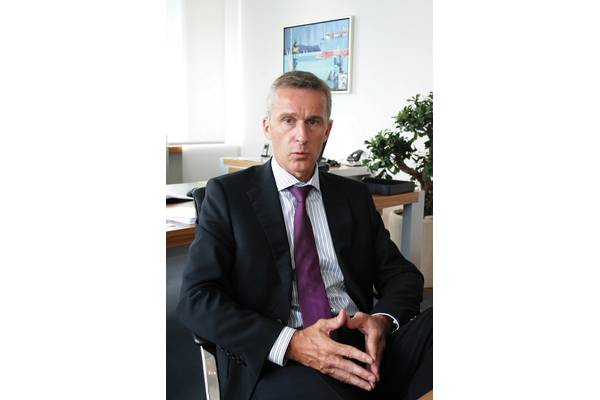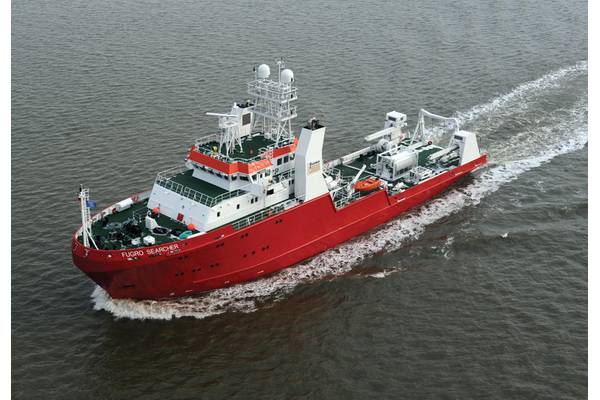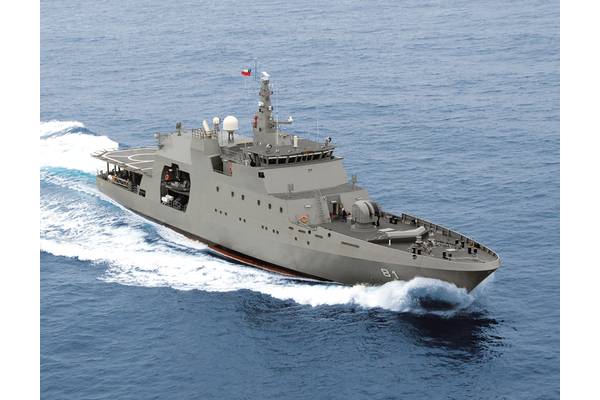


Harald Fassmer is the new Chairman of Verband für Schiffbau und Meerestechnik e. V. (VSM), the German organization representing the country’s political and commercial maritime industry interests. Mr. Fassmer also happens to be a ubiquitous figure in the international maritime circuit, serving as executive partner at Fr. Fassmer GmbH & Co.KG. In May, former VSM Chairman Werner Lüken handed over the reins to Mr. Fassmer, and here – on the occasion of SMM in Hamburg – he shares with Maritime Professional’s Peter Pospeich insights on the future direction of the German Maritime industry.
First of all, congratulations on your appointment as Chairman of VSM. Already a member of the VSM Steering Committee, and as successful businessman in your own right, what led to your appointment as Chairman?
The steering committee asked if I want to take over the assignment as a Chairman for the next cycle. I’m looking forward into this additional assignment and I’m honored with the confidence that has been placed to me.
In Germany, we have a saying: “A new broom sweeps clean.” What will be your first and most important activity?
Our previous Chairman, Mr. Lüken, has represented the interests of the Association in an excellent manner and I hope that I can do this in the same way. Your adage saying “a new broom sweeps clean” is therefore not appropriate. Nevertheless, we are seeing a permanent change of the political and economic framework. Therefore, the concerns of VSM have to be adaptable. That’s because VSM represents the political and commercial interests of the German maritime industry, comprising shipyards building oceangoing and inland waterway vessels as well as marine equipment suppliers, classification societies, ship model basins and engineering consultants. The responsibilities of the association include providing members with specialist advisory and support services and representing their interests in public and vis-à-vis political institutions. The VSM also promotes technical and commercial development in the shipbuilding and ocean industry in Germany and abroad. The Association represents its members nationally and internationally. VSM is a member of BDI (Bundesverband der Deutschen Industrie e. V.), the German Society for Maritime Technology STG (Schiffbautechnischen Gesellschaft), the European shipbuilding organization CESA (Community of European Shipyards’ Associations) as well as the association of equipment manufacturers EMEC (European Marine Equipment Council).
During the VSM general assembly in Hamburg, you alluded to “Mastering the challenges in the construction of special-purpose vessels.” What does that actually mean and how do you go forward?
In spite of existing problems, shipbuilding and marine technology in Germany are well positioned in a European comparison and form the basis of a maritime growth strategy. This is essential for overcoming maritime targets, ranging from green shipping to regenerative energy supply, particularly in the field of offshore wind energy. Numerous challenges remain. More difficult financing options, caused by the increase in equity capital requirements and unwillingness by banks to accept new risk lead to considerable problems in ship financing. Therefore, functioning financing instruments are essential. For example, this involves the necessary adaptation and expansion of export credit insurance and federal state guarantees. The legal requirements for ship safety as well as marine environmental and climate protection pose additional challenges. With the implementation of new environmental standards, economic incentive systems and direct, practice-orientated supporting measures should be provided. With special-purpose vessels, offshore platforms and structures, as well as the development of clean and energy-efficient technologies, the structural change in the German shipbuilding industry is on the right course. The current keywords, ‘green shipping’ and ‘blue growth’, stand for real growth prospects, if these are dealt with across industries, segments and countries using concrete measures. However, improvements in the framework conditions are essential for this, in order to bear up to the tougher competition, which is being triggered by the aggressive acquisition policy, particularly in Korea and China. The unbridled expansion of construction capacities by both countries far exceeds the medium and long-term demand for new ships with the consequence that the Asian competition is also trying to penetrate the niche markets of special-purpose vessels. Furthermore, extensive support programs are being established far more intensively in Asia than in Europe. In order to counteract this, we need an offensive industrial policy strategy, industry-appropriate framework conditions and particularly the goodwill and willingness to cooperate with participants in Germany and the EU.
Where is the German maritime industry succeeding, and more importantly, where can it improve?
German Shipyards, ships and maritime suppliers align their product portfolio almost exclusively on the building of high tech special ships and competencies. Industry relies on existing professional competence and the innovational strength of their employees and focused on further personnel progress. The restructuring of the German shipbuilding industry requires these merits and a substantial upgrade of engineers; in terms of both quality and quantity. Beyond this, shipyards changing production from series-build into single and small-series production of special purpose vessels require a much higher number of engineers. It is for these reasons that, for our member companies, the term “shortage of skilled labor” is not a political phrase, but a real challenge in the effort to increase German industrial competitiveness. German repair yards have diversified their activities, expanding into power plant construction, for example, to generate new market segments. The repair and maintenance of naval and government vessels is also an essential linchpin of the domestic market.
The move toward emissions reduction and the increasing fuel prices offer the opportunity for renovations and upgrades to the efficiencies, as well as environmental protection technologies. All represent a strong demand potential. Ballast water treatment, emission control systems and other fuel saving technologies belong to this. German repair yards are equipped with enough capacity to carry out the necessary modification works on time. In terms of location, German shipbuilding is well positioned.
With well-developed infrastructure, good leadership and a well-educated staff, the relatively high labor costs nevertheless remain an issue. The current overcapacity in the market and a lack of trained engineers also weigh on the sector.
How will the German shipbuilding industry position itself for the future? Where does it fit into the global scheme?
Although the commercial shipbuilding markets account for as much as 80 percent of global shipbuilding output – containerships, tankers and bulkers, for example – this will not be the focus for German shipbuilders. Our focus must be on the remaining 20 percent of the market, represented by special purpose vessels. Nevertheless, this challenging but also profitable market will be a future target for Asian shipyards. Beyond the special purpose vessels, however, offshore technology also becomes more important. Here, German companies must position themselves as soon as possible. The same holds true for the maritime environmental protection, which will include the repair, the modification and the upgrade of existing ships.
Despite the current economic slowdown, the world’s merchant fleet will nevertheless grow in the long run. Repair capacity therefore remains important as both seagoing and inland shipping must be prepared to meet the coming environmental requirements, not only on new ships but also with existing fleets. We have to take advantage of this.
Finally, a look ahead to the upcoming SMM International Trade Fair leads us to ask you what major focus – for the German shipbuilding industry and for your own enterprise – do you see at this time?
At this year’s 25th Jubilee, SMM once again shows why it is the world’s leading trade fair of the maritime economy and maritime sector. What does SMM offer in 2012? Innovation, products, analysis of performance and trends – all presented by more than 2,000 exhibitors from over 60 countries on more than 90,000 square meters of floor showspace. More than 50,000 professional visitors from around the world are expected.
International conferences and congresses on current issues will complete the show. And, do not forget the integration of the international conference for maritime Safety and Defencepolitics (MS&D).
With this, SMM visitors get an overview of the newest technologies during the four day duration of the show. We, Fassmer Shipyard, as an exhibitor, will present at this venue and we look forward to interesting conversations.
(As published in the 3Q edition of Maritime Professional - www.marinelink.com)




